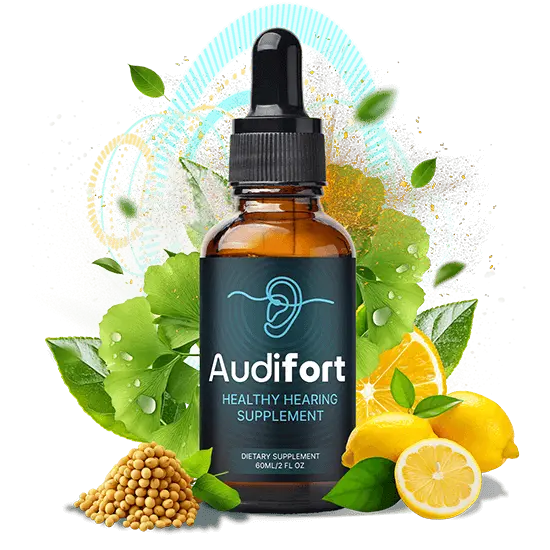Audifort Review: Can This Formula Truly Silence Tinnitus?
Audifort is a dietary supplement heavily marketed to individuals suffering from tinnitus (ringing in the ears) and general hearing concerns. Its core promise is to offer relief by addressing what it claims are the root causes of these issues: nerve inflammation and stress. The product presents itself as an all-natural solution for restoring auditory clarity and peace. This review will dissect the formula ingredient by ingredient to determine if scientific evidence backs these ambitious claims.
I wouldn’t recommend it.
Score: 4.8/10
Detailed Ingredient Analysis: What’s Inside Audifort?
The efficacy of any supplement lies in its formula. Audifort’s strategy appears to focus on reducing anxiety and inflammation rather than directly targeting the auditory system. Let’s analyze the key active ingredients.
Note: The exact dosages per ingredient are not disclosed, as they are contained within a 620mg “proprietary blend.” This is a major drawback, as it prevents a precise analysis of each component’s efficacy.
Calming and Adaptogenic Blend
- Rhodiola Rosea & Ashwagandha
- What are they? Potent adaptogens used for centuries in traditional medicine to help the body resist physical and chemical stressors.
- What does science say? Extensive research confirms their ability to reduce levels of cortisol (the stress hormone), combat fatigue, and improve overall well-being. A study published in the Journal of Alternative and Complementary Medicine demonstrated Ashwagandha’s effectiveness in reducing anxiety.
- Is the dosage effective? The clinically effective dosage for Ashwagandha (especially KSM-66 extract) is 300-600mg per day, and for Rhodiola, it’s 200-600mg. It is highly unlikely that Audifort contains an effective dose of both within a 620mg blend that also includes over ten other ingredients.
- L-Theanine, Chamomile, Lemon Balm, Hops & Valerian
- What are they? A group of compounds and herbs known for their calming and sedative properties.
- What does science say? L-Theanine, found in green tea, promotes relaxation without drowsiness. Valerian and Chamomile are commonly used as sleep aids. Science supports their use for mild anxiety and insomnia, which can indirectly alleviate tinnitus that worsens with stress.
- Is the dosage effective? Again, the lack of dosage transparency is a critical problem. Effective doses (e.g., 200mg for L-Theanine, 300-600mg for Valerian) cannot possibly be accommodated within this small proprietary blend.
Other Supporting Ingredients
- Bacopa Monnieri
- What is it? A nootropic herb used in Ayurvedic medicine to enhance cognitive function.
- What does science say? Research supports its role in improving memory and reducing anxiety. Its connection to auditory health is theoretical and not directly proven in robust clinical studies.
- Is the dosage effective? The standard dosage is 300mg of a standardized extract, which is impossible within Audifort’s formula.
- B-Vitamins, Zinc, & Magnesium
- What are they? Essential micronutrients.
- What does science say? Deficiencies in these nutrients can lead to neurological issues, and some studies correlate low zinc and magnesium levels with tinnitus. However, supplementation is only beneficial if a pre-existing deficiency is present.
- Is the dosage effective? The amounts are likely too small to correct a significant deficiency.
Efficacy Analysis: Can Audifort Deliver on its Promise?
Based on the ingredient analysis, Audifort has limited potential to fulfill its primary promise.
The formula is essentially an anti-anxiety and anti-stress supplement, not a treatment for tinnitus or hearing loss. The synergy between the ingredients is clear: they all work to calm the nervous system. If an individual’s tinnitus is significantly aggravated by stress and anxiety, they might notice a symptomatic and mild relief.
However, the product contains no ingredients with strong scientific evidence for regenerating ear hair cells, improving cochlear blood flow, or treating the underlying physiological causes of most tinnitus and hearing loss cases. The promise to “silence” tinnitus is a marketing hyperbole not supported by the formula’s composition.
Safety and Side Effects
While the ingredients are generally natural, they are not without risks:
- Potential Side Effects: Drowsiness, dizziness, headache, and gastrointestinal discomfort are possible, especially given the combination of multiple sedative ingredients.
- Drug Interactions: Ingredients like Ashwagandha can interact with thyroid, diabetes, and blood pressure medications. Valerian and Hops can potentiate the effect of sedatives and alcohol.
Who should NOT take this product (Contraindications):
- Pregnant or breastfeeding women.
- Individuals taking sedative, antidepressant, or anticoagulant medications.
- People with autoimmune diseases or thyroid disorders.
- Anyone who needs to operate heavy machinery or drive, due to the potential for drowsiness.
- Always consult a healthcare professional before starting any new supplement.
Cost-Benefit Analysis
At the time of this review, Audifort is priced as follows:
- 1 Bottle: $69 + shipping
- 3 Bottles: $177 ($59 per bottle)
- 6 Bottles: $294 ($49 per bottle)
The price per serving is extremely high, ranging from $1.63 to $2.30. Most of the ingredients in the formula (like Ashwagandha, L-Theanine, Magnesium) can be purchased individually, in clinically effective dosages and with purity testing, for a fraction of this cost.
The cost-benefit of Audifort is very poor. The consumer is paying a premium price for an underdosed proprietary blend of common ingredients.
Manufacturer’s Reputation
The company behind Audifort operates with a concerning lack of transparency.
- There is no clear information about the manufacturer or their location.
- The sales website uses high-pressure marketing tactics and a long-form video sales letter (VSL) format, which is typical of low-credibility affiliate products.
- There is no mention of third-party testing to verify the purity and potency of the ingredients, a critical standard in the high-quality supplement industry.
The brand’s reputation is, therefore, considered very low.
I wouldn’t recommend it.
Score: 4.8/10
| Criteria | Score (1-10) | Weight | Weighted Score |
| Formula Efficacy | 4.0 | 40% | 1.6 |
| Safety & Purity | 5.0 | 30% | 1.5 |
| Cost-Benefit | 3.0 | 20% | 0.6 |
| Brand Trust | 2.0 | 10% | 0.2 |
| NutralabReviews Final Score | 4.8 / 10 |
Recommendations
- We Recommend For: Individuals with mild tinnitus who believe it’s strongly exacerbated by daily stress and who don’t mind paying a premium for a convenience formula, after having ruled out other causes with a healthcare professional.
- We do NOT Recommend For: Anyone seeking a proven treatment for chronic tinnitus or hearing loss. Individuals on a budget or those who value transparency and evidence-based dosages.
FAQ (Frequently Asked Questions)
1. How long does it take for Audifort to work? The company suggests using it for several weeks to see results. However, due to the nature of the ingredients, any effects (primarily relaxation) might be felt within a few hours, but there is no guarantee they will impact tinnitus.
2. Is Audifort safe? While the ingredients are natural, the blend can cause drowsiness and interact with various medications. The lack of third-party testing raises questions about purity. It is crucial to consult a doctor before use.
3. Is there a money-back guarantee? Yes, the official website offers a 60-day money-back guarantee. However, consumers should be aware of the terms and conditions, including return shipping costs.
4. Can Audifort cure tinnitus? No. There is no scientific evidence that Audifort or any dietary supplement can “cure” tinnitus. At most, it may help manage stress-related symptoms.



